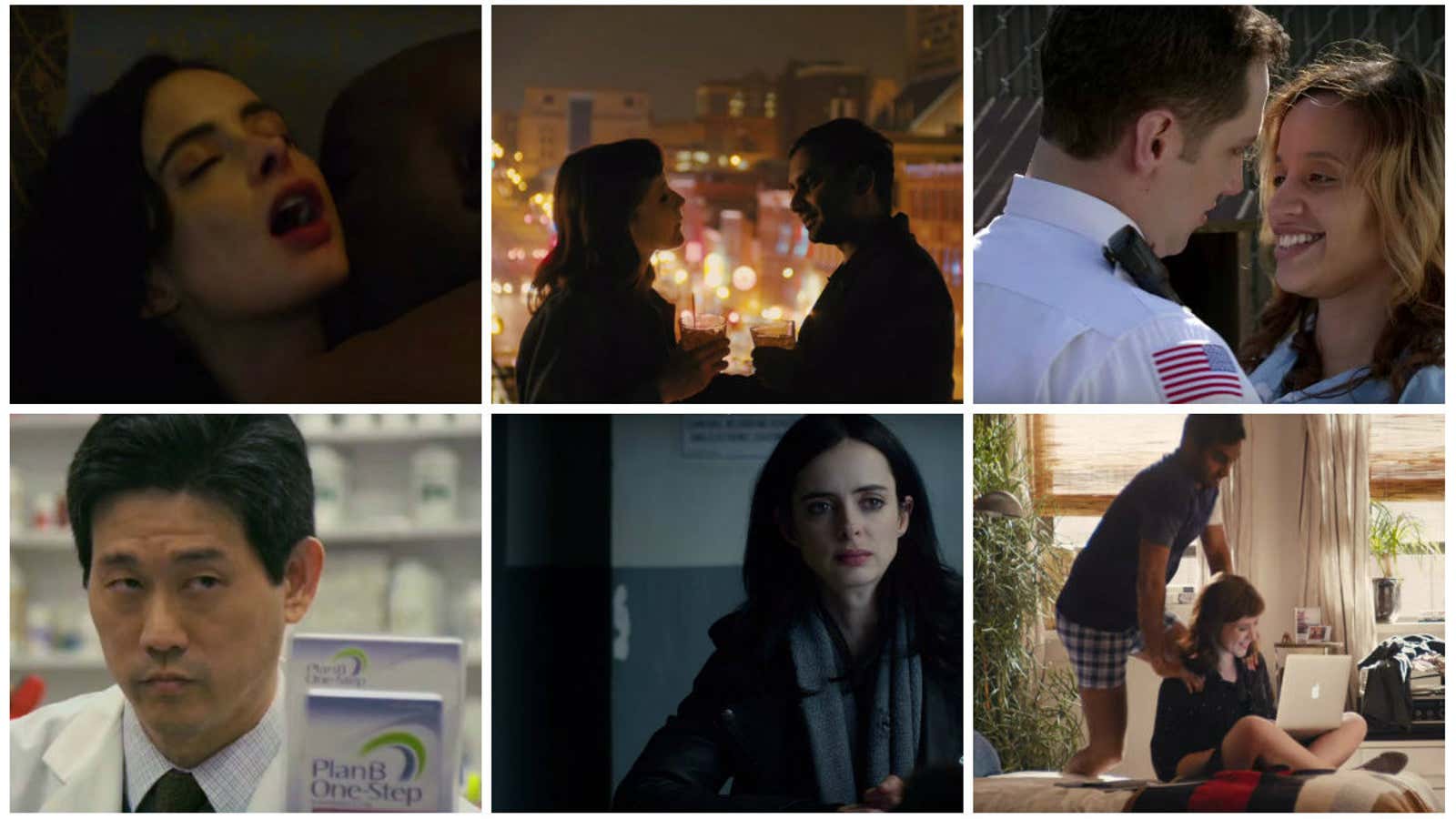Titillation is a staple of Western television, especially premium cable. In an attempt to justify subscription fees, network executives encourage showrunners to amp up the nudity (even in relatively unsexy fare like Starz Original Party Down). Sexposition has in fact become such a regular occurrence on shows like Game of Thrones that it’s practically a running joke; and with upcoming series like HBO’s Westworld reportedly requiring extras to consent to simulated sex, it seems clear that premium cable remains committed to the prurient.
As a subscription based service, Netflix falls into a similar camp as premium cable—and its first forays into original programming didn’t seem much different from HBO or Cinemax. The first season of Orange is the New Black featured its fair share of random boobs and sexy shower scenes, some more justified by the plot than others. But as Netflix’s collection of original series has expanded and matured, something’s shifted in tone. Orange is the New Black’s most recent season took an impressive turn away from sexploitation with a thoughtful, nuanced episode about Tiffany “Pennsatucky” Doggett’s (Taryn Manning) sexual experiences, ranging from consensual to nonconsensual to somewhere in between. And with the addition of Master of None and Jessica Jones to the Netflix lineup, the streaming service seems to be making a commitment to programming that treats sexuality as more than just sensationalism.
On the surface, the shows couldn’t be more different: Master of None is a lighthearted comedy about a thirtysomething city dweller figuring out dating, work, and how to be an adult; Jessica Jones is a gritty superhero drama about a woman coping with rape and abuse-induced post-traumatic stress disorder (PTSD). And yet both shows offer a complex view of sexuality that’s rarely seen in the television landscape.
In Aziz Ansari’s Master of None, sex is interwoven into the plot in a way that feels natural and effortless: characters deal with broken condoms, have affairs, and make jokes about the awkwardness of orgasms because these things are a part of daily life, not because they’re making some broader point or statement. Unlike HBO’s millennials-in-the-city dramedy Girls, sex on Master of None never seems intended to shock or provoke: there’s a playful, relaxed vibe that permeates the series’ sex scenes. Throughout the series, sex is presented as fun, silly, awkward, and occasionally gross. This degree of humanity is a welcome respite from the glossy, often over serious, erotic scenes that dot the TV landscape.
Even when Master of None treads into more standard sex-related plot lines, it manages to do so in a way that feels fresh. Protagonist Dev (Ansari) and love interest Rachel (Noël Wells) cope with a broken condom by securing emergency contraception and moving on with their lives, not by cementing their relationship with an unplanned pregnancy. An episode that touches on infidelity refuses to dehumanize or punish the cheating wife. In an interesting reversal, the affair is actually posited to have made her marriage stronger by forcing her to examine and repair her relationship.
Refreshing as Master of None’s casual approach towards sex is, it’s Jessica Jones that is the true game changer, largely due to the way it elevates the treatment of sex in a genre not often known for its maturity towards the topic.
Like many female superheroes, Jones’s (Krysten Ritter) backstory includes experiences of sexual assault and abuse; unlike many of her peers, Jones’s degradation is treated with sensitivity, and never used to arouse the audience or torture Jones for the viewer’s amusement. Most notably, Jessica Jones draws a clear line between sex and abuse. Jones’s dalliances with a super-powered bartender, or her best friend’s with a cop, always feel positive and celebratory, an affirmation of life in a world where death is never far away. Both stylistically and tonally, these scenes are worlds away from any interactions with villain Kilgrave; a cinematic reinforcement of the notion that sexual assault is about power, not sex.
It’s telling that, in a narrative permeated with themes of abuse and control, Jones’s sex scenes feel sexy largely because they’re explicitly positioned as an act of free will: characters may murder and mutilate one another under the control of the show’s central villain, but their sexual experiences are expressly consensual. Given the often casual (and frequently eroticized) use of rape throughout the comic book universe, it’s stunning to see a show based on a Marvel property take such a strong stance at the opposite end of the spectrum.
Despite its traditional position as an easy, lazy way to punch up a flaccid plot, sexuality is a nuanced, complicated aspect of the human experience worthy and deserving of consideration and respect. Master of None and Jessica Jones offer two varied takes on how television might tackle the topic in an honest and authentic way that engages the audience without relying on cheap sensationalism. Hopefully they’re merely the beginning of a whole new wave of thoughtful, sex smart entertainment–if not across the television landscape at large, than at least on the increasingly influential universe of Netflix.




